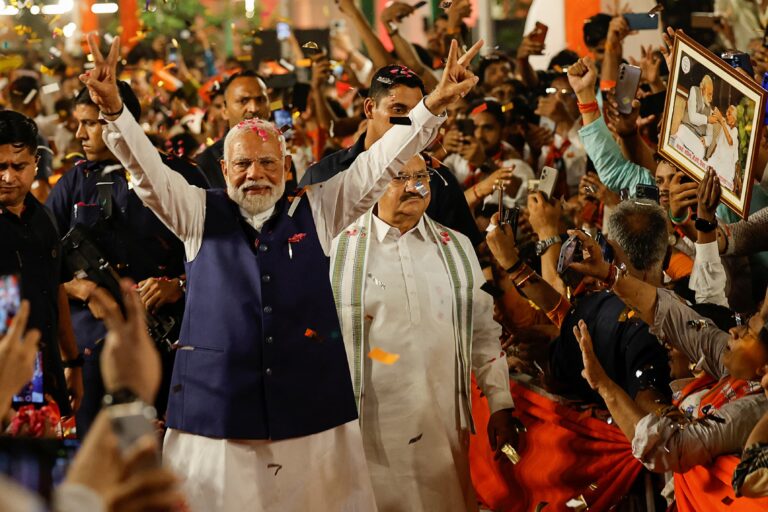- Observers say the outcome of India’s election will be a major political blow to Prime Minister Narendra Modi and his ruling party and will have a major impact on how he will run the country in the future.
- “We are in uncharted territory,” Neelanjan Sircar, a senior fellow at the Centre for Policy Research in New Delhi, said Wednesday.
- Veteran investor David Roche called the election result “karma”, adding that it was an election that Modi was going to lose.
Indian Prime Minister Narendra Modi gestures as he arrives at the Bharatiya Janata Party (BJP) headquarters in New Delhi, India, on June 4, 2024.
Adnan Abidi | Reuters
Observers say the outcome of India’s election will be a major political blow to Prime Minister Narendra Modi and his ruling party and will have a major impact on how he will run the country in the future.
Modi did not win the landslide victory widely predicted in exit polls before the results were counted, and instead faces a third term with a much weaker approval rating than initially expected.
His Bharatiya Janata Party has lost dozens of seats, dropping its projected total to 240 – short of a majority in the lower house of parliament.
This is a stark difference from the overwhelming successes the BJP had in 2014 and 2019, when it won 282 and 303 seats respectively, giving it a majority on its own.
In a speech at the Bharatiya Janata Party headquarters in New Delhi on Tuesday, Prime Minister Modi displayed a brave stance, boasting about his victory in the elections, saying, “This is the first time since 1962 that this government has won a third term.”
He added that this would be “a new ‘golden chapter’ in India’s development.”
But the consequences for Modi are more complicated: For the first time in his decade in power, he will have to rely on coalition partners, some of whom may not agree with his economic or political policies.
“We are in uncharted territory,” Neelanjan Sircar, a senior fellow at the Centre for Policy Research in New Delhi, said Wednesday.
“I have not seen a situation where the Modi government has to form a coalition government. I know the party has been committed to decisive action, to centralisation,” Sarkar told CNBC’s “Squawk Box Asia.”
“Will parties and leaders be able to coordinate in the way that is required when leading a coalition government?” he said, adding that Modi was likely to have an “uneasy relationship” with his coalition partners.
India’s main opposition party, the once-dominant Indian National Congress, won 99 seats, a sharp reversal from the 52 it won in 2019.
The opposition coalition, along with its coalition partner the Allied Powers for India (INDIA), won 233 seats, far exceeding expectations.
Veteran investor David Roche called the election result “karma”, adding that it was an election that Modi was going to lose.
“His face is everywhere, but it’s been lost in the northern core states. That’s very significant because it tells you something is wrong,” Roche, president and global strategist at Independent Strategy, said Wednesday on CNBC’s “Street Signs Asia.”
He said the result showed that Modi’s Hindu nationalist campaign promises had not worked in “Hindu nationalist regions”, adding that he expected Modi to focus on economic reforms in future governance.
The BJP’s performance in Uttar Pradesh, a ruling stronghold for the past decade, was one of the biggest shocks of the elections, as the party suffered notable defeats there, with some of its political stalwarts including Smriti Irani losing their seats.
In another setback in Ayodhya, the BJP lost the key constituency of Faizabad just months after Modi inaugurated a new Ram temple, a highly controversial building built on the site of a mosque destroyed by Hindu extremists and which analysts claim was aimed at energising the Hindu voter base.
In the last two elections, the BJP has really locked down the “Hindi-speaking heartland” of India, Sarkar said.
Analysts added that three states — Maharashtra, Uttar Pradesh and Rajasthan — faced very heavy losses this time around and attributed this primarily to the Modi government’s expanding mandate.
“Two chief ministers have been arrested. Many other opposition leaders have been put under investigation by the authorities…. There have been concerns about the constitution in some places,” Sircar said, adding that the government had crossed several “red lines”.
Critics say Modi’s authoritarian rule has led to a crackdown on minority rights and civil society, signaling a backslide of democracy in India.
Going into the election, Modi’s popularity endured despite India’s economic problems, including high youth unemployment, inflation and income inequality.
While Modi retains his charisma, he has lost his “aura of electoral omnipotence,” Michael Kugelman, director of the Wilson Center’s South Asia Institute, said in a post on X.
“This is a big part of what has defined him as a leader for so long,” he said, adding that it was a “humbling moment” for both the BJP and Modi.
On Tuesday, with election results still trickling in, Indian National Congress party leader Rahul Gandhi said the election results were a victory for the Indian people and democracy.
“This was a fight to protect the Constitution,” he told a news conference in New Delhi, adding that it sent a strong message to Modi that “the people do not like the way you are governing the country.”
Roche said the election results were “good news” for India’s democracy as a whole.
“We want India to be a true democracy, not a state created on a populist basis, which will ultimately damage its economic performance further.”

